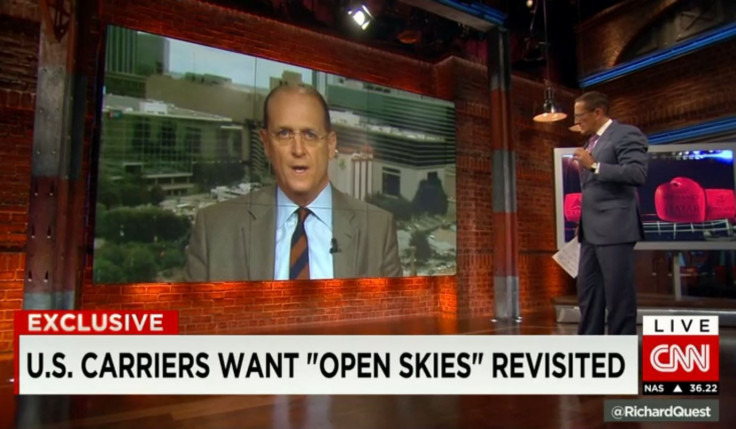Delta CEO Richard Anderson Links Gulf Airlines Like Emirates And Etihad To 9/11 Attacks

Update 4:45 p.m. EST: Delta Air Lines responded to International Business Times's request for clarification after this story had been published. Spokeswoman Betsy Talton said this in a statement emailed to IBT:
“The point Richard was making is this: Emirates, Qatar and Etihad have long tried to defend their government bankrolls by characterizing the 9/11 payments and Chapter 11 bankruptcy as subsidies. This couldn’t be further from the truth. The first was a modest one-time payment to U.S. airlines in the aftermath of the U.S. airspace closure after 9/11. That shutdown and its aftermath resulted in the loss of tens of thousands airline jobs and billions of dollars in debt and equity for investors. Ch. 11 is a completely transparent process that involves no government funding.
The Middle East carriers, meanwhile, capitalized on that difficult time in the industry's history to begin in earnest an unfettered expansion that was largely paid for with subsidies from their governments.”
Original story:
Delta Air Lines CEO Richard Anderson made waves during an on-air interview Monday with CNN journalist Richard Quest when he linked rival Persian Gulf-region airlines like Emirates, Qatar Airways and Etihad Airways to the Sept. 11, 2001, terrorist attacks.
Anderson appeared on “Quest Means Business” to discuss the unfair advantages -- as perceived by U.S. airlines -- Gulf carriers possess by way of alleged government assistance and subsidies.
When asked whether Chapter 11 bankruptcy protections for American carriers also could be considered government assistance, Anderson responded, “It’s a great irony to have the UAE from the Arabian Peninsula talk about that, given the fact that our industry was really shocked by the terrorism of 9/11, which came from terrorists from the Arabian Peninsula.”
Delta, the world’s second largest airline by passengers carried, did not immediately respond to a request by International Business Times to clarify Anderson’s comments.
The full exchange is below:
Richard Quest: To the allegation that, well, you restructured under Chapter 11. The U.S. fleet certainly gains benefits from the civil defense fleet. American has just restructured. The argument is that you, in your own ways, have had your hand in the bailout trough.
Richard Anderson: That is categorically false. And it’s a great irony to have the UAE from the Arabian Peninsula talk about that, given the fact that our industry was really shocked by the terrorism of 9/11, which came from terrorists from the Arabian Peninsula. That caused us to go through a massive restructuring. And in the United States our restructuring process is transparent and there is no government subsidy. And in fact there were billions of dollars of equity and unsecured debt that were wiped out through that process.
Anderson’s inflammatory remarks come at a time when American air carriers are waging a campaign to get the government to roll back some provisions of the “open skies” agreements the U.S. has with countries like the United Arab Emirates and Qatar. These treaties allow airlines to operate in each other’s countries without restriction.
Persian Gulf carriers have expanded significantly in the American market in recent years, gobbling up revenue that once would have belonged to legacy carriers like American, Delta and United. A recent report circulated to the White House by the three U.S. airlines indicated that their share of bookings from the U.S. to destinations in South and Southeast Asia dropped by five percentage points to 34 percent since 2008, while combined bookings on Emirates, Qatar and Etihad for the same routes soared to 40 percent in 2014, up from 12 percent in 2008.
Such numbers certainly have U.S. carriers running scared. But analysts say that despite these circumstances, Anderson’s remarks were inappropriate and inaccurate.
“Mr. Anderson’s comments are simply unacceptable and are beneath him. The Gulf carriers played no role in 9/11. It’s a completely inappropriate analogy to make,” said Henry Harteveldt, a travel industry analyst with Atmosphere Research Group who has known Anderson since both worked for Continental Airlines in the 1980s. “I was stunned because he’s typically a very careful and thoughtful communicator. It’s completely out of character for him.”
Fifteen of the Sept. 11 hijackers were, in fact, from Saudi Arabia -- whose state-owned airline, if one wants to extend Anderson's analogy, is not a threat to U.S. carriers. American Airlines, Delta and United Airlines have all filed for bankruptcy in the last 13 years.
After the interview with Anderson, Quest publicly invited the CEOs of Emirates, Etihad Airways and Qatar Airways to appear on his show in response to the contentious comments. Executives from the Gulf airlines have addressed allegations of government assistance in the past. Most recently, Emirates CEO Tim Clark told UAE newspaper the National that his airline has never received financial subsidies or bailouts.
Watch the full interview between Quest and Anderson below:
© Copyright IBTimes 2025. All rights reserved.




















